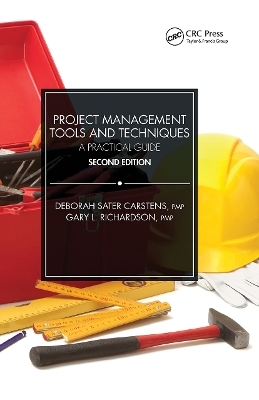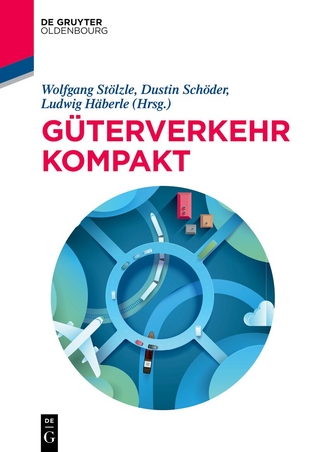
Project Management Tools and Techniques
CRC Press (Verlag)
978-1-032-24158-6 (ISBN)
The topic of project management is truly an evolution of art seeking science. This activity involves balancing project objectives against the constraints of time, budget, and quality. Achieving this balance requires skill, experience, along with the use of many tools, and techniques which are the focus of this book.
This new edition provides updated content to incorporate examples from Microsoft Project 2016 and material from the Project Management Body of Knowledge (PMBOK® Guide), sixth edition. The chapter structure includes step-by-step instructions regarding the basic mechanics and various software tools that can be used to assist in the processes. To reinforce the textbook’s learning objectives, extra material is provided on the textbook website. This includes mechanical tool examples and lab assignments representative of the chapter topics. An external video tutorial library is available to help with various mechanics related to Microsoft Project mechanics. An instructor manual is available for qualifying adoptions for classroom use.
NOTE: Chapter 26 is not in the textbook and is only located in the book's Downloads tab on the CRCPress.com website.
Features
Illustrates the use of Microsoft Project throughout the project life cycle
Offers templates as productivity enhancement tools
Includes supplemental material for students and instructors
Provides assignments for hands-on experience
Follows the PMI PMBOK ® Guide model structure that will support a better understanding of the model and help prepare students for PMP and CAPM certification
Illustrates both traditional and contemporary management techniques
Dr. Deborah Sater Carstens, PMP, is a Professor of Aviation Human Factors and Graduate Program Chair at the Florida Institute of Technology (Florida Tech), College of Aeronautics. She has worked for Florida Tech since 2003, where she instructs both graduate and undergraduate students teaching in on-campus and online programs. Formerly, she was a faculty member in information systems and the Academic Chair for the Project Management Track in the Online MBA Program when she worked in the Bisk College of Business. Before Florida Tech, she worked for the National Aeronautics and Space Administration (NASA) at the Kennedy Space Center (KSC) from 1992 to 2003. In her career both at Florida Tech and at NASA KSC, she has been the principal investigator over funded research from the Federal Aviation Administration (FAA), NASA, Small Business Administration (SBA), Florida Department of Education (DOE), Department of Health and Human Services (DHHS), Oak Ridge Associated Universities (ORAU), and other organizations. Her research has been in project management, human factors, learning effectiveness, and government accountability. She received her Ph.D. in Industrial Engineering and B.S. in Business Administration from the University of Central Florida. She also holds an MBA from Florida Tech. She has over 70 publications. Dr. Gary L. Richardson, PMP, recently retired as the PMI Houston Endowed Professor of Project Management at the University of Houston, College of Technology graduate level project management program. Gary comes from a broad professional background, including industry, consulting, government, and academia. After graduating from college with a basketball scholarship, he served as an officer in the U.S. Air Force, leaving after four years of service with the rank of Captain. He followed this as a manufacturing engineer at Texas Instruments in the Government Products Division. Later, non-academic experience involved various consulting-oriented assignments in Washington DC for the Defense Communications Agency, Department of Labor, and the U.S. Air Force (Pentagon). A large segment of his later professional career was spent in Houston, TX with Texaco, Star Enterprise (Texaco/Aramco joint venture), and Service Corporation International in various senior IT and CIO level management positions. Interspersed through these industry stints, he was a tenured professor at Texas A&M and the University of South Florida, along with adjunct professor stints at two other universities. He moved to the University of Houston in 2003 to create their project management graduate program and retired from that university in 2019. During this period, he taught various external project management courses to both international and U.S. audiences. He held professional certifications as Project Management Professional (PMP), Professional Engineer (PE), and Earned Value Management (EVM). Throughout his career, he has published eight computer and management related textbooks and numerous technical articles. Gary earned his B.S. in Mechanical Engineering from the Louisiana Tech, an AFIT post-graduate program in Meteorology at the University of Texas, an M.S. in Engineering Management from the University of Alaska, and a Ph.D. in Business Administration from the University of North Texas. His broad experience associates with over 100 significant-sized projects of various types over a more than fifty-year period have provided a wealth of background in this area as he observed project outcomes and various management techniques that have evolved over this time.
Section I: Project Environment. 1. Role of the Project. 2. Introduction to the PMBOK Guide. 3. Project Organization and Authority Structures. 4. Project Management Environment. 5. Gaining Support for a Project. Section II: Planning Processes. 6. Developing the Project Scope. 7. Developing the Work Breakdown Structure (WBS). 8. Activity Estimating. 9. Quick Start Example. 10. Creating the Project Schedule. 11. Creating the Project Resource Budget. 12. Creating a Viable Project Plan. 13. The Project Control Structure. Section III: Supporting Processes. 14. Communications Management. 15. Team Management. Section IV: Project Execution. 16. Performance Metrics. 17. Earned Value Management. 18. Status Tracking. 19. Analyzing the Project Plan. 20. Integrated Change Control. 21. Resource Leveling. Section V: Advanced Tools and Techniques. 22. Agile Development: The Iterative Approach. 23. Variable Time Analysis. 24. Simulation Modeling. 25. Risk Management. Index.
| Erscheinungsdatum | 14.12.2021 |
|---|---|
| Zusatzinfo | 180 Illustrations, black and white |
| Verlagsort | London |
| Sprache | englisch |
| Maße | 156 x 234 mm |
| Gewicht | 657 g |
| Themenwelt | Technik ► Umwelttechnik / Biotechnologie |
| Wirtschaft ► Betriebswirtschaft / Management ► Logistik / Produktion | |
| Wirtschaft ► Betriebswirtschaft / Management ► Projektmanagement | |
| Wirtschaft ► Volkswirtschaftslehre | |
| ISBN-10 | 1-032-24158-6 / 1032241586 |
| ISBN-13 | 978-1-032-24158-6 / 9781032241586 |
| Zustand | Neuware |
| Informationen gemäß Produktsicherheitsverordnung (GPSR) | |
| Haben Sie eine Frage zum Produkt? |
aus dem Bereich


